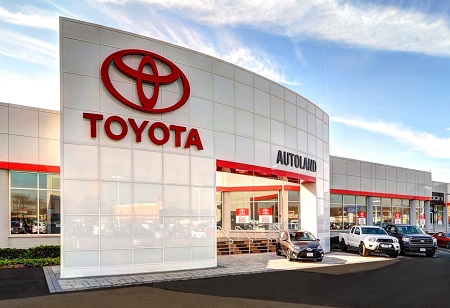Toyota Motor Corp will triple its planned investment in a new battery plant in the US from $1.29 billion to $3.8 billion, it said in a move that acknowledges greater consumer demand.
Battery maker Panasonic will be a partner in the factory in Liberty, North Carolina, through its Prime Planet Energy & Solutions (PPES) joint venture with Toyota, a senior official at Toyota Motor North America said.
The Liberty plant is slated to open in 2025. PPES will provide expertise in battery making technology and equipment, Norm Bafunno, senior vice president of powertrain manufacturing and engineering at Toyota Motor North America said.
Panasonic also has a joint battery making venture with Tesla in Nevada and recently announced plans to build a $4 billion plant in Kansas that is expected to supply Tesla and other automakers.
When Toyota announced the initial $1.29 billion investment last fall, North Carolina said the state would boost reimbursement to Toyota by $315 million if the company’s investment topped $3 billion.
Toyota now plans to add two production lines dedicated to making batteries for fully electric vehicles at the Liberty plant, in addition to the four lines initially planned to make smaller batteries for hybrid vehicles such as the Toyota Prius, Bafunno said. He declined to provide the plant’s planned production capacity.
Initially, he said, the plant will make lithium-ion batteries using relatively conventional electrode technology – a mixture of nickel, cobalt and manganese for the cathode and graphite for the anode. But newer technologies, including solid state electrolytes, could be introduced over time.
“This technology is going to evolve quickly,” Bafunno explained.
The higher investment figure for the Liberty plant follows the recent passage of the US Inflation Reduction Act, which provides incentives for manufacturers and tax credits to consumers aimed at boosting local content in EVs and batteries.
Toyota, which is the world’s biggest carmaker, will also invest about 400 billion yen on plants and a the PPES joint venture with Panasonic in the western Japanese city of Himeji.
The firm is aiming to begin battery production between 2024 and 2026 with an investment intended to augment battery production capacity in both the countries by up to 40 gigawatt hours (GWh).
News of Toyota’s spending plans comes hot on the heels of an announcement on Monday by Honda Motor and Korean battery supplier LG Energy Solution that they will build a $4.4 billion lithium-ion battery plant for EVs in the US.
Battery makers are looking to increase production in the US to catch the shift toward electric vehicles as the country implements stricter regulation and tightens tax credit eligibility.
The location of the plant has not been finalised, the companies said, but two people briefed on the matter confirmed reports Honda is seriously considering Ohio, where Honda‘s main US factory is located.
Honda and LGES are also aiming for annual production capacity of approximately 40 GWh with the batteries supplied exclusively to Honda facilities in North America to power Honda and Acura EV models.
The pair are expected to establish a joint venture before building the plant, with the start of construction planned for early 2023 and mass-production by the end of 2025.
Ohio Governor Mike DeWine said his administration is working with Honda and LG “to ensure that they choose Ohio for this new electric battery plant.” The sources briefed on the matter said an announcement on the location could come in weeks.
The US has been pushing policies designed to bring more battery and EV manufacturing into the country. President Biden signed a $430-billion climate, healthcare and tax bill this month that will render EVs made outside North America ineligible for tax credits.
White House Deputy National Climate Advisor Ali Zaidi praised the Honda-LG “massive investment” that he said was catalyzed by climate and infrastructure legislation.
US Energy Secretary Jennifer Granholm said the administration was bringing “back the domestic manufacturing of batteries to provide Americans with good-paying jobs that will power the EV revolution.”
California announced a plan last week requiring all new vehicles sold in the state by 2035 to be either electric or plug-in electric hybrids.
The two firms said a combination of strong local EV production and a timely supply of batteries would put them “in the best position to target the rapidly-growing North American EV market.”
LG Energy Solution, which is mainly engaged in the development of lithium-ion battery materials and next-generation batteries, also supplies EV batteries and has signed joint-venture agreements with General Motors, Hyundai Motor Co and Stellantis.
Earlier this year, Honda laid out a target to roll out 30 EV models globally and produce about 2 million EVs a year by 2030.
